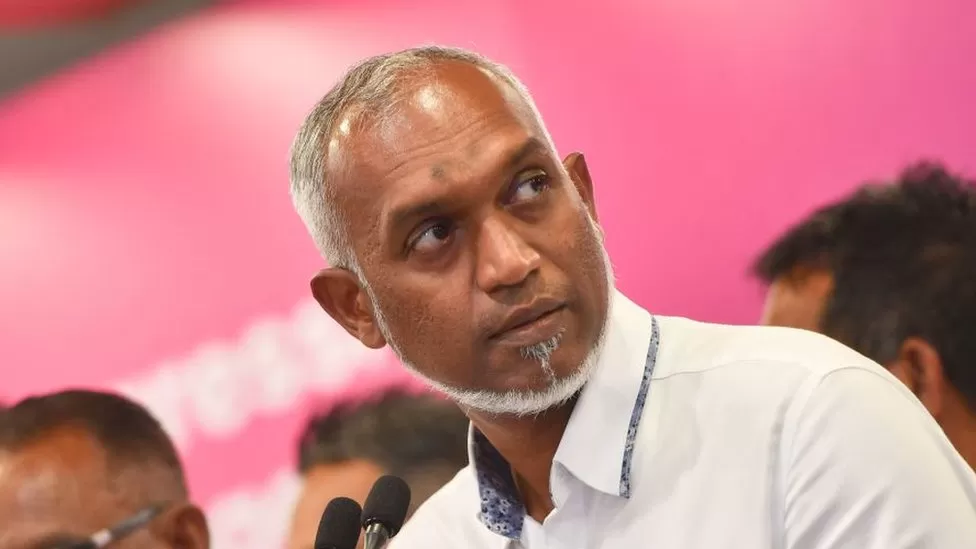The already strained bilateral relations between the Maldives and India, which have been deteriorating in recent weeks, took a further hit as the Maldivian government formally requested the withdrawal of Indian troops from the island nation by March 15. This demand was articulated during Sunday’s inaugural meeting of a high-level core group between the two countries held in the Maldivian capital, Male.
Abdulla Nazim Ibrahim, the public policy secretary in President Mohamed Muizzu’s office, stated, “Indian military personnel cannot stay in the Maldives. That’s the policy of this administration.” Approximately 80 Indian troops are currently stationed in the Maldives, with Delhi asserting that their presence is necessary to operate two rescue and reconnaissance helicopters and a Dornier aircraft donated years ago.
The removal of Indian military personnel from the Maldives was a central campaign promise of President Muizzu, who assumed office in mid-November. His electoral platform emphasized an ‘India out’ policy, pledging to repatriate Indian troops and diminish Delhi’s influence.
In response, Delhi mentioned that officials from both nations discussed “finding mutually workable solutions to enable continued operation of Indian aviation platforms that provide humanitarian aid and medevac [medical evacuation] services to the people of the Maldives” during Sunday’s meeting. However, the Indian foreign ministry’s statement did not specify a timeline for the withdrawal of Indian soldiers from the islands.
This development comes shortly after President Muizzu’s state visit to China, where he and President Xi Jinping agreed to elevate bilateral relations to a comprehensive strategic cooperative partnership. Before the visit, a diplomatic row ensued between India and the Maldives following derogatory comments about Indian Prime Minister Narendra Modi made by three Maldivian deputy ministers on social media. The ministers were subsequently suspended amid public outcry.
Despite the diplomatic tensions, President Muizzu adopted a defiant tone during a press conference upon his return from Beijing. He announced plans to diversify food imports and overseas healthcare services to reduce the Maldives’ dependence on India. Mr. Muizzu expressed intentions to import food from Turkey, and medicines from Europe and the US, and highlighted the option for eligible Maldivians under a state health insurance scheme to seek treatment in Dubai and Thailand, diverting from the current reliance on India and Sri Lanka. He emphasized the Maldives’ independence, stating, “We are not a country that is in the backyard of another country. We are an independent nation,” concluding with a firm assertion: “We may be small, but that doesn’t give you the license to bully us.”

The response from President Muizzu is perceived as a reaction to the significant social media backlash in India following the controversial comments made by the Maldivian deputy ministers about Prime Minister Modi. Hashtags advocating for a boycott of the Maldives gained traction on Indian social media throughout the past week.
Also Read: 7 Reasons To Travel To The Maldives During The Coronavirus Pandemic
Analysts view President Muizzu’s recent comments as some of the most robust since taking office, signaling a foreign policy approach that is less centered on India. However, experts caution that while Male may be seeking a diplomatic resolution to differences with Delhi, making such public statements implicating the closest bilateral partner could be counterproductive and potentially lead to irreversible damage in India-Maldives relations, according to Azim Zahir, a Maldivian political analyst.
Many in the Maldives question the practicality of President Muizzu’s plans to reduce dependency on India for food and medicines. Some argue that while importing food from anywhere, including Turkey, is feasible, the higher transport costs could make it less economical compared to importing from India, as noted by Ali Azim, a senior leader of the Democratic party. Azim suggests that President Muizzu may be attempting to generate “anti-India sentiments” ahead of the upcoming parliamentary elections in March.
Maldivian experts highlight that President Muizzu’s firm stance towards Delhi is also influenced by support from Islamist hardliners, including the ultra-conservative Salafis, in the country. This assertive position coincides with a time when India’s government supporters emphasized its “muscular foreign policy” and India’s rise as an economic and military power.
India’s Foreign Minister S Jaishankar responded to the diplomatic row with restraint, acknowledging the dynamics of politics. He stated, “Politics is politics. I cannot guarantee that in every country, every day, everybody will support us or agree with us.”
Given the Maldives’ dependence on India for essential aspects like food, infrastructure development, and healthcare, the ongoing diplomatic spat raises concerns among residents in Male. While some express worry about Delhi’s reaction, others harbor resentment about India’s perceived “overbearing presence” in the archipelago. Analysts caution that without concessions from India, there is an increased risk of a serious rift between Delhi and Male.

